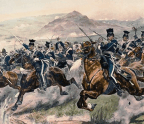

The popular conception of the end of World War II is that the Americans dropped two atomic bombs on Hiroshima and Nagasaki, after which Japan surrendered. Events, however, were not as simple as that. Barrett Tillman’s When the Shooting Stopped recounts the dramatic and complex events that took place during the war’s final month.
As Tillman explains, momentous changes were put in motion at the July 17–Aug. 2, 1945, Potsdam Conference, changes that would determine the course of the postwar world for decades to come. Amid the conference Winston Churchill, Britain’s prime minister since 1940, was voted out of office and replaced by Clement Attlee. Potsdam was also the first international summit conference attended by newly inaugurated U.S. President Harry Truman, and it was during that conference Truman was informed for the first time about the successful test of the atomic bomb.
Meanwhile, despite the tightening of the Allied






